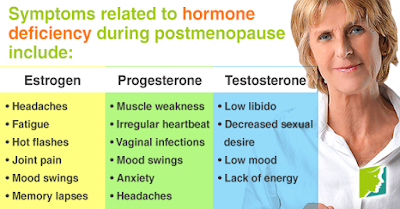 |
| Post Menopause |
The term "postmenopausal" describes women who have not experienced any menstrual flow for a minimum of 12 months, assuming that they have a uterus and are not pregnant or lactating. In women without a uterus, menopause or postmenopause can be identified by a blood test showing a very high FSH level. Thus postmenopause the time in a woman's life that take place after her last period or, more accurately, after the point when her ovaries become inactive.
The reason for this delay in declaring postmenopause is because periods are usually erratic at this time of life. Therefore, a reasonably long stretch of time is necessary to be sure that the cycling has ceased. At this point a woman is considered infertile; however, the possibility of becoming pregnant has usually been very low (but not quite zero) for a number of years before this point is reached.
 |
| Symptoms Related to Post Menopause |
A woman's reproductive hormone levels continue to drop and fluctuate for some time into post-menopause, so hormone withdrawal effects such as hot flashes may take several years to disappear.
Any period-like flow during postmenopause, even spotting, must be reported to a doctor. The cause may be minor, but the possibility of endometrial cancer must be checked for.

